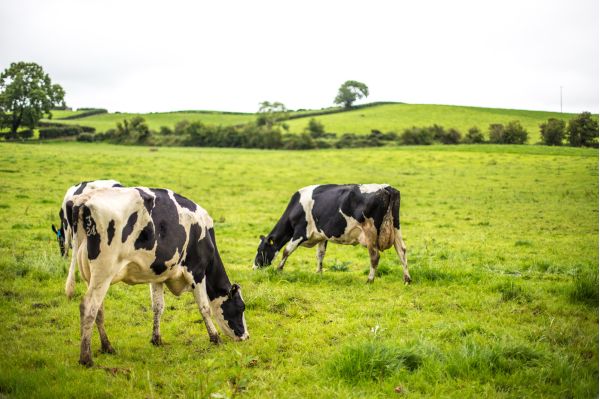Co-operative by name, co-operative by nature

The theme of the IYC is ‘Co-operatives Build a Better World’ and while TJ would obviously agree with this observation, he also knows that this is no easy feat, nor does he take the success of Ireland’s co-operative movement for granted: “It has had a real impact, and it continues to have an impact. It’s in very good health. Obviously it’s stronger in the dairy sector and in certain parts of the livestock industry. That suits people’s needs, but you can’t take this success for granted.
“It takes a lot of work to keep a co-op healthy and relevant and to keep members engaged and involved. That doesn’t happen by accident. It takes committed leadership and members who will go to meetings and get involved by standing for election, attending AGMs, and challenging the board by holding it to account. They are all signs of a healthy democratic co-operative movement.”
TJ believes in the inherent dynamism of co-operative endeavour: “From the outside, co-ops may not appear to be super dynamic, but to be fair, farmers are conservative people who make long-term investment decisions and they’re not going to be swayed by flash-in-the pan decision-making. Their co-operative businesses have to match the needs of the farmer and their business and their commitment and long-term investment in farming. Co-op operations are reflective of that long-term business view.”
A refreshing approach
There have been a number of significant developments in ICOS over the last few years, TJ explains: “Our co-ops initiated a huge body of work over the last five or six years, which culminated in significant rule and policy changes. They looked far and wide across Europe and the world to see how other co-operatives had developed, what was tried and tested and what worked best for attracting and keeping members involved. Reaching out to young farmers, including female farmers who, unfortunately, hadn’t been involved enough in the industry, was a particular priority.”
This approach, he says, is starting to pay dividends already. He continues: “We are seeing some really strong and impressive females make their way up through the co-op, particularly up to the governance structure. Refreshing the membership register has also been a priority and we have seen significant rationalisation and updating in recent years. It’s a perennial challenge, with retiring farmers, and the need to continuously recruit active farmers. At the same time, you must respect the commitment of those people through a lifetime of farming and co-operative membership. But ultimately you have to concentrate decision-making among the people who have skin in the game.
“It takes a fair bit of work, particularly by the secretary, the management and board of a co-op in keeping the share register updated regularly, getting new members involved, getting them to buy shares and, ultimately, coming up with mechanisms whereby you can ultimately concentrate the power and control among those people.”
The next steps in co-operation
Will the evolving farming sector in Ireland lead to further rationalisation of marts and co-ops here, does he think? “When I joined ICOS, we were told the marts were finished, that there were too many in the country. There’s only a handful of fewer marts now than 30 years ago. They have probably had the best couple of years they’ve had in a long time. But yes, there will be more rationalisation in time.
“Farmer numbers are reducing. Farmers trading needs are changing. Meanwhile, marts are probably more relevant now than they were 10 years ago. Online trading has created a new dynamic in livestock sales. It was something people thought couldn’t happen, but the Covid-19 pandemic made it happen overnight and now it’s just part of the normal trading system.”
It is the dairy co-ops where the biggest rationalisation changes have occurred, TJ says: “In terms of the dairy co-ops, which have the highest profile, we’ve seen huge changes includung amalgamations and mergers – Tipperary and Arrabawn being the most recent example of that, but not the last.
“Looking at some statistics recently, I saw that in 1914, there were 1,000 general dairy co-op societies in the country. There are probably 20 at the moment, eight of whom have broad-based processing facilities. With new technologies and practices, it’s a constant process and there’ll be ongoing consolidation within the sector, but it’ll happen in its own time.”

The co-op’s co-op
Owned by Irish co-ops, Kerrygold is a huge standout success for the Irish dairy industry. It is a very valuable brand and Ornua is a very valuable business. TJ says: “If we keep producing milk in the way that we do – off grass – then the Kerrygold platform is a fantastic one from which to monetise that unique selling point. We have lots of other routes to market whether it’s infant formula inputs or co-ops in joint ventures or subsidiaries across the world. They all work in parallel, but Ornua is a key business within the Irish co-op structure.”
The European dimension
ICOS has a long history of European involvement, TJ explains: “Cooperation and co-operatives, are not a uniquely Irish structure. There’s a big European dimension and ICOS is fully involved in that. We have had an office in Brussels since we joined the EEC in 1973. It’s very important to have a presence in Brussels. That’s where the big decision making takes place. We have a lot of involvement at the moment in terms of the common market organisation, which is a regulation around the relationship between farmers and their co-ops. Obviously the nitrates piece is red hot at the moment in Brussels. The general policy emphasis in Brussels changes all the time and it’s always important for us to monitor and influence those ongoing policy developments.”
Competitive co-operation
Competition between dairy co-ops here is ‘red hot’ says TJ, and that is no bad thing. It keeps them on their toes, he says: “To be fair, they have to compete with each other. They constantly chase efficiency to give the best value to their members. Sometimes the milk price debate gets really contentious, perhaps too much so. But on balance, it’s probably a good thing that co-ops have to compete with each other to demonstrate to members that they are the most efficient that they can be.
At the end of the day, the model it has worked. “Our co-op structure is among the strongest in the world and serves farmers well. Some co-ops had their dalliances with public limited companies and other structures. They have now decided the core business of processing milk is best based in a co-op structure.”
A diverse organisation
The ICOS chief explains the diverse activities of the organisation: “Our core focus is on the co-ops, their rules and governance and their structures and the health of the Irish co-op movement. We have lots of other operations. We administer a couple of pension schemes for the industry, for instance. We run a Skillnet that delivers up to 15,000 person days of training a year. We have our Brussels office, along with key representation at national level on animal health and welfare bodies, and animal transport. Our lobbying role is very active, including on the Nitrates Directive. We run a European Innovation Project on generational renewal. They’re all complementary and core to a healthy co-op.”





